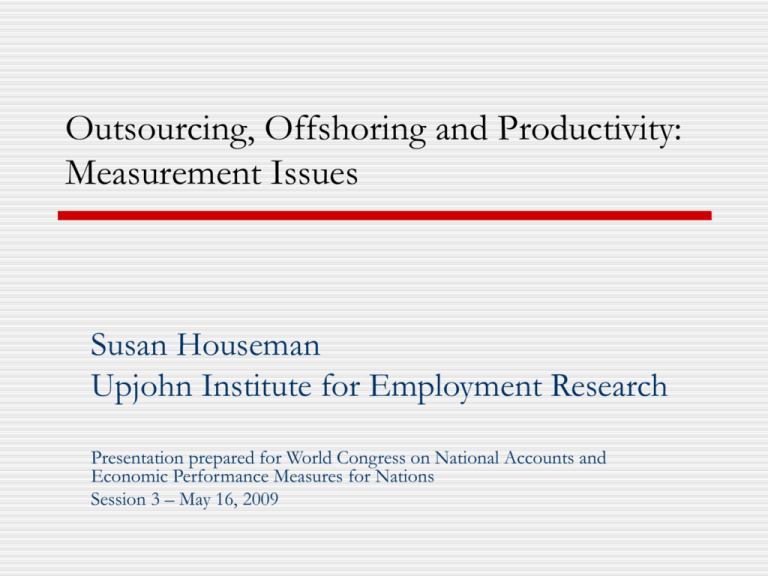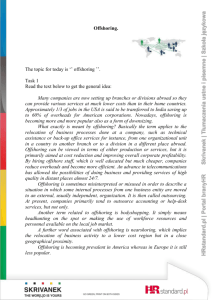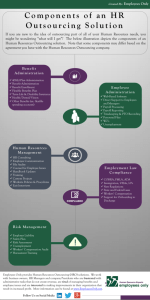Problems measuring input price changes with
advertisement

Outsourcing, Offshoring and Productivity: Measurement Issues Susan Houseman Upjohn Institute for Employment Research Presentation prepared for World Congress on National Accounts and Economic Performance Measures for Nations Session 3 – May 16, 2009 Outline Distinguishing import price measurement issues related to product variety v. outsourcing & offshoring Outsourcing and offshoring o Definitions o Causes Problems measuring input price changes with changes in sourcing Evidence on growth of outsourcing & offshoring Why measurement issue important Distinguishing from Import Prices and Gains from Variety Literature Recent literature focuses on problems in measuring prices in trade models with product differentiation & monopolistic competition Debate on whether growth in trade → growth in “variety” of goods o Feenstra (1994), Broda & Weinstein (2006), Feenstra, Reinsdorf, & Slaughter (2008), Arkolakis, et al. (2008) If growth imports → increase variety, consumer surplus from variety not measured: price index growth overstated, domestic output growth overstated, productivity overstated Distinguishing from Import Prices and Gains from Variety Literature Models assume separability between domestic & imported goods – substitution between domestic and imported goods not explicitly considered Any bias to price index theoretically depends on low substitutability of new varieties: o “when existing varieties are close substitutes to new or disappearing varieties, changes in variety will not have a large effect on exact price index.” (Broda & Weinstein 2008) o Offshore outsourcing primarily concerns the substitution of relatively homongeneous foreign inputs for domestic inputs Outsourcing & Offshoring Use broad definition: o Change in sourcing of inputs in the production of a good or service Types of outsourcing & offshoring: o Switch from something produced internally in organization to domestic supplier (domestic outsourcing) o Switch from producing internally to foreign supplier (offshore outsourcing) or to foreign affiliate (offshoring) o Switch from domestic to foreign supplier (offshore outsourcing) Outsourcing & Offshoring Examples: o Manufacturer outsources labor services to staffing agencies o Manufacturer offshores first stage of production of good, keeps final finishing of product in U.S. o Bank offshores back office functions o Retailer shifts from domestic to imported goods or manufacturer switching from domestic to imported inputs Driving force of outsourcing & offshoring: o Factor price arbitrage: substitution of lower priced input for internally or domestically produced good or service o Reducing production costs for any given good or service, not increase in product variety Offshore Outsourcing & Offshoring Trade models of comparative advantage appropriate for offshoring phenomenon o Product cycle theory of international trade (Vernon 1966) o Complicated by fact that much of trade occurs within financially related parties & production of single product or service may become divided among countries Growth of offshoring outsourcing & offshoring driven by confluence of factors: o Reduction tariffs (Feenstra, Reinsdorf, & Slaughter 2008) o Reduction transportation & communication costs o Economic & political reforms major parts of the world – China, Eastern Europe o Rapid economic development many countries Problems measuring input price changes with changes in sourcing Price measurement system assumes stable sourcing patterns Important set of cases in which input price drop associated with outsourcing & offshoring not measured – even when goods & services homogeneous o Real value of outsourced or offshored input understated – price index growth overstated, o Real domestic output and/or sector value-added growth overstated, o Aggregate and/or sectoral productivity overstated Problems measuring input price changes with changes in sourcing (cont.) Certain tasks outsourced or offshored – labor input now becomes purchased services or materials input—no price drop measured across input categories (Houseman 2006, 2007) o o Wage cut effected via wage reduction to employees – no first order effect on measured productivity Wage cut effected by firing employees, outsourcing or offshoring task to lower paid workers → drop in input price not measured, productivity overstated Shift from domestic, internal production to domestic contractor or offshore o “slicing the value chain” (Krugman 1996), “intra-mediate trade” (Antweiler & Trefler), “disintegration” (Yuskavage et al. 2008) Problems measuring input price changes with changes in sourcing (cont.) Shift from domestic, internal production to domestic contractor or offshore – Affects measurement for goods & services: o Services: Mann (2004) emphasizes lack of prices for services – need to develop with growth services offshoring o Goods example: First stage of production of good sent overseas – final finishing kept in U.S. → new imported good not previously observed → price drop not measured Shift from domestic supplier to foreign supplier o No link between domestic price series & import price series → input price drop not captured o Business Week furniture example (Mandel 2007) Shift from one foreign supplier to another o Price drop captured only if importer the same Size of any bias to output & productivity measures Don’t know – But body of evidence suggests growing importance of outsourcing & especially offshore outsourcing/offshoring o Rapid increase in imports relative to GDP o Growth of imports dominated by growth of imports from developing countries – especially China o Studies indicate rapid shifts in sourcing of intermediate inputs Growing Importance of Imports from Developing Countries Imports as percent GDP grew from 10.8% in 1989 to 17.0% in 2007 Developing countries— growth non-oil imports: o o 56% 1989-2000 70% growth 2000-2007 Imports and Exports as Percent of GDP, 1989-2007 30 Imports + Exports 25 20 Growth imports from China especially dramatic: 15 13% growth non-oil imports 1989-2000 39% growth 2000-2007 5 o o Imports Exports 10 0 1989 1992 1995 1998 2001 2004 2007 Evidence of growth of outsourced and imported intermediate inputs Domestic providers of outsourcing services – significant growth in share of GDP 1982-2006: 7% to 12% Domestic outsourcing esp. strong durable manufacturing Substantial substitution imported inputs for domestic inputs in production of goods & services 1997-2005 Manufacturing Real Output and Employment 1989-2007 (Indexes, 1992=100) 170 Value-added 150 130 Sectoral Output 110 90 Growth imported intermediates esp. strong manufacturing – accelerated 1997-2005 Employment 70 50 1989 Yuskavage, Strassner, Medeiros (2008); Kurz & Lengermann (2008) 1992 1995 1998 2001 2004 2007 Why Measurement Issues Important Potential bias to sector and aggregate output & productivity measures – real value of outsourced & offshored goods & services understated Data measurement issues preclude answering key questions about offshoring – What impact does substitution of lower-cost imports for domestically produced goods & services have on: o Employment, esp. manufacturing employment? o Wages and wage inequality? o Consumer prices? Data not suited for answering these questions o Structure of sourcing assumed stable o Price drops associated with outsourcing & offshoring not adequately measured o Studies biased against finding impacts Other measurement issues related to growth of globalization Reclassification of manufacturers to wholesalers Timeliness of BEA benchmark I-O tables and validity of import comparability assumption Measurement of services offshoring among multinationals Intangible assets Data point from the furniture industry Manufacturer produced desk in Holland, Michigan: o Cost of production $3,750 o Sale price $5,000 o Profit $1,250 Shifted production to the Philippines o Cost of production $ 500 o Sale price $4,500 o Profit $4,000 Example illustrates o Cost savings/input price declines can be large o Manufacturer becomes wholesaler o Changes in CPI from domestic to imported good may not be good measure of input price change





